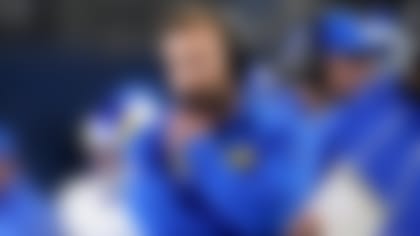Quarterback Donovan McNabb eagerly bounded onto the practice field with his Minnesota Vikings teammates Thursday afternoon in Mankato, Minn., before being told that he and other NFL players with new contracts still needed to be patient.
And then, shortly before 5 p.m. ET, the good news came: The wait was over. The NFL officially was back in business, collective bargaining agreement and all. That 4½-month lockout? A thing of the past in every way.
[Official CBA signing
live on NFL Network:
NFL Commissioner
Roger Goodell and
NFLPA executive director DeMaurice Smith will sign the new CBA on Friday at 11 a.m. ET
in front of the Pro Football Hall of Fame in Canton, Ohio.
"Were we going to have the opportunity to step on the field today? Was this thing going to linger?" McNabb said, explaining his thoughts while on hold for word of a completed CBA. "Good thing we got this thing settled. And now here we are."
Players ratified a new, 10-year CBA on Thursday, hours after it was finalized, and a source told NFL Network's Albert Breer that the labor deal allows the NFL to eventually become the first major U.S. professional sports league to use blood testing for human growth hormone.
Players would be subject to random testing for HGH, in addition to annual checks -- as is the case for all banned substances in the league's drug-testing program -- only after the union is confident in the way the testing and appeals process will work.
"We have to see if we agree with the test," Jacksonville Jaguars cornerback Rashean Mathis said. "If we agree with the test, then it's legit. If not, they have to come up with another one."
The aim is to have everything worked out in time to start HGH testing by Week 1 of the regular season, but that isn't guaranteed.
"Everyone in this game has championed making sure drugs aren't involved in our game. So we are finding our way through this," said Indianapolis Colts center Jeff Saturday, who was one of the players' key negotiators in recent months. "It hasn't been easy, just understanding all the ins and outs of it."
Most of the deal to end the NFL's first work stoppage since 1987 was agreed to last month, but certain elements still needed to be ironed out after the NFL Players Association re-established itself as a union. The NFLPA -- which dissolved as a union in March, when the old CBA expired, allowing players to sue the league in federal court -- was recertified by last weekend. Final CBA language was in place Thursday afternoon in talks between the parties' lawyers in Washington.
Not every player welcomed the new CBA with open arms.
"We felt like it was getting shoved down our throats," Pittsburgh Steelers offensive tackle Willie Colon said. "Our player reps (weren't) comfortable with it ... We're not going to just file it away the way other teams do."
When the union informed the league that the final agreement had been approved, it meant players who signed contracts July 26 or after -- and had been forced by NFL rules to sit out practices for days -- could join teammates in drills Thursday, as the new "league year" officially began.
"We were like little kids in Pop Warner who didn't make weight, just standing around," said McNabb, who restructured his contract when he was traded to the Vikings by the Washington Redskins last week.
The NFL's website about the labor dispute was shut down a little after 5 p.m. Later Thursday night, the federal court in Minnesota that was the venue for the antitrust suit filed by Tom Brady and other players, as well as a TV networks "lockout insurance" case, officially deemed those cases dismissed.
As a final, formal step, NFL Commissioner Roger Goodell and NFLPA executive director DeMaurice Smith will sign the CBA on Friday morning at the front steps of the Pro Football Hall of Fame in Canton, Ohio. That's where the only game canceled by the lockout was supposed to be played Sunday, between the Chicago Bears and St. Louis Rams.
Among the CBA elements that were settled this week: parameters for penalties associated with on-field discipline and new disability program guidelines. Under a new neuro-cognitive disability benefit, for example, players don't have to prove that their mental disability was related to playing football.
For on-field offenses -- which grabbed headlines last season when the league made a point of more strictly enforcing existing rules about illegal hits -- the NFLPA must be consulted before a player is suspended or fined more than $50,000. And players now will be able to argue on appeal that a fine is excessive if it exceeds 25 percent of one week's pay for a first offense or 50 percent of a week's pay for a second offense.
The off-field personal-conduct policy remains largely unchanged and in Goodell's hands.
The most significant new item in Thursday's agreement, though, is the HGH testing, which was the last topic holding up a completed deal.
Goodell has been keen to have players tested for HGH, saying in an interview with The AP in August 2010: "It's about the integrity of the game."
"We think it's important to have HGH testing, to make sure we ensure that we can take performance-enhancing substances out of the game," Goodell said then.
Preventing athletes from using HGH is considered a key target in the anti-doping movement. The substance is hard to detect, and athletes are believed to choose HGH for a variety of benefits, whether they be real or only perceived -- including increasing speed and improving vision.
Last year, Major League Baseball implemented random blood testing for HGH in the minors, making it the first U.S. professional sports league to take that aggressive step against doping. Baseball was able to impose that on players with minor-league contracts because they aren't members of the players' association, which means blood testing isn't subject to collective bargaining.
Gary Wadler, who until this year led the World Anti-Doping Agency's committee that considers which substances should be banned in sports, cautioned Thursday that it will be important to find out the specifics that eventually are agreed to by the NFL and players.
"You can get a sound bite out of saying the NFL and NFLPA have adopted a blood-testing policy. You can say, 'That's pretty good,' and forget the rest of the story," Wadler said in a telephone interview. "But the devil's in the details. The rest of the story might be equivalent to having no testing at all."
NFL Network's Albert Breer and The Associated Press contributed to this report.



